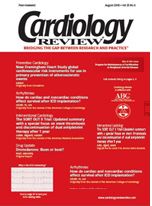A hypertensive patient with atrial fibrillation
A 59-year-old man had occasional heart palpitations over the past 2 months. He had been feeling well, had no relevant medical or surgical history, and was not taking any medication. He was physically active (tennis, golf, and bicycle riding) and had no limitations. Specifically, he had no cardiovascular risk factors except for high blood pressure as measured during a medical visit 1 year earlier. Despite dietary modifications, his blood pressure remained high when measured in pharmacies (155/95 mm Hg). His palpitations started 2 months earlier and occurred four to five times per week, mostly during the day and rarely during the night, without any relationship to physical activity. The palpitations were often associated with mild dyspnea, and each episode was self-limited and lasted 15 to 20 minutes.
Results of the physical examination showed a man in good general condition. His blood pressure was high, at 160/95 mm Hg, and his heart rate was 70 beats per minute and was regular. Heart sounds were normal, without gallop or murmur, and the rest of the physical examination was normal. His electrocardiogram was normal, with sinus rhythm. Echocardiographic findings were also normal. Results of ambulatory Holter monitoring showed two short episodes of symptomatic atrial fibrillation.
This patient was hypertensive despite 1 year of diet modification. He presented with paroxysmal atrial fibrillation. Anticoagulant and antihypertensive therapy were initiated. In light of our recent study on the subject, the patient was prescribed an angiotensin-converting enzyme inhibitor as antihypertensive therapy to decrease blood pressure and prevent recurrent atrial fibrillation.
